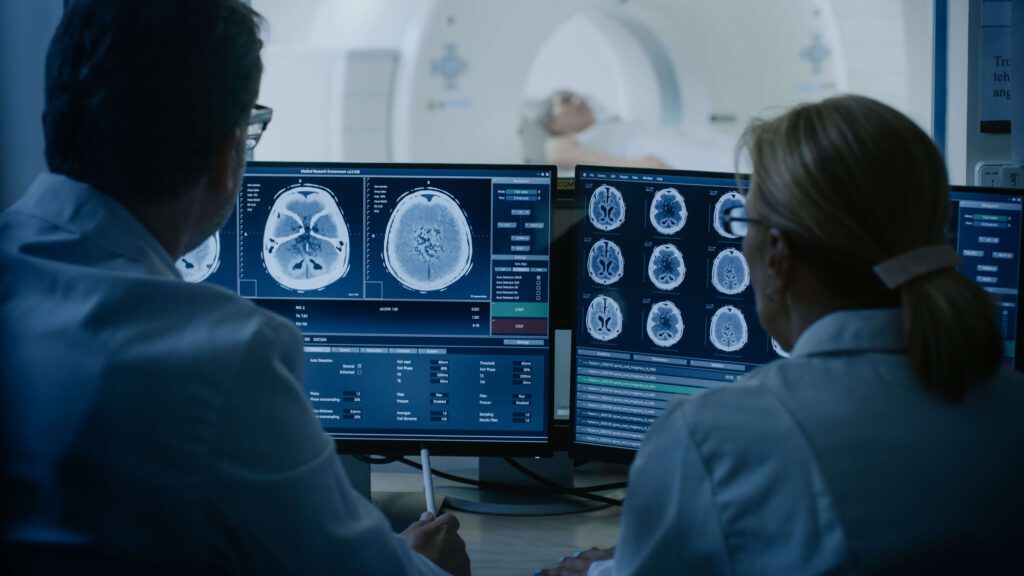Finding out that you need a brain MRI can be a little intimidating. Rest assured, lots of people feel exactly the same way, especially if they’ve never had an MRI scan.
For starters, you should know that just like any MRI scan, a brain MRI is non-invasive and very safe for most people. Your brain MRI results will give your healthcare provider detailed information they’ll use to provide you with the right care.
This guide will give you a close look at why your provider chose a brain MRI, at how to get ready for your MRI scan, and at what you can expect on the day of your scan.
We’ll walk you through the process of preparing for your brain MRI, step-by-step, so you’ll know exactly what to expect along the way.
Why did my healthcare provider recommend a brain MRI?
An MRI scan (or Magnetic Resonance Imaging scan) of the brain can offer insight into various concerns, including headaches, seizures, hearing loss, age related confusion, concussions, or even issues with vision.
Your brain is one of the most intricate and crucial organs in your body. When your healthcare provider recommends a brain MRI, it’s often because they want a detailed and clear image of your brain to explore further, understand, and potentially diagnose any issues or abnormalities that might be occurring there.
In particular, a brain MRI helps your healthcare team to investigate any anomalies within the brain that may be impacting your health and wellbeing.
How is a brain MRI different from other types of MRI scans?
A brain MRI focuses specifically on capturing detailed images of your brain and spinal cord. The technology utilizes strong magnets and radio waves to generate images that can illustrate a detailed view of the different structures and tissues within your brain.
Similar to other types of MRIs, a brain MRI might require a contrast agent, which is a substance that helps to enhance the visibility of certain structures within the brain, providing your radiologist with a clearer and more detailed picture to analyze. When focusing on the brain, precise images are paramount as they help healthcare professionals to discern and diagnose any potential issues with utmost accuracy.
Are brain MRIs safe? Are there any risks?
Generally speaking, brain MRIs are considered to be a safe and non-invasive medical scan. They do not rely on radiation, which often is a point of concern in other imaging techniques.
However, it’s imperative to discuss any concerns, conditions, or personal health histories with your healthcare provider before undergoing the study. For instance, due to the strong magnets used during the scan, it’s vital to disclose any metallic implants, pacemakers, or shrapnel that might be present in your body to avoid any complications or risks.
While the use of a contrast agent is deemed safe for most individuals, some may experience an allergic reaction or have concerns regarding kidney function if you have a kidney disease that needs to be discussed beforehand. Always ensure that your healthcare provider and our radiology technologists know about all aspects of your medical history, so they can ensure your safety and comfort throughout the MRI process.
What questions should I ask my healthcare provider before my brain MRI?
Before your MRI, you might ask your provider what exactly your scan is looking for.
get clarity on when and how you will get the MRI results, and the subsequent steps that might follow, based on your results.
How do I make sure that all my health concerns and conditions are addressed?
Ensuring all your health concerns and conditions are addressed demands clear, open, and transparent communication with our healthcare team.
Prioritize making a comprehensive list of any medical conditions, previous surgeries, and current medications you’re taking, along with notes on any allergies or sensitivities.
If you have any metallic implants, devices, or other specific concerns related to the MRI’s magnetic field, make sure to communicate these explicitly.
How do I tell my provider if I’m anxious about my brain MRI? What if I’m nervous about my results?
It’s absolutely normal to feel nervous before an MRI, whether it’s anxiety about the scan itself or anticipation regarding the results. Please don’t hesitate to share these feelings with your healthcare provider.
Expressing your anxiety about the MRI allows your team to provide you with additional information, resources, or potentially explore options like oral sedation (as available).
When it comes to anxiety about results, discussing this upfront with your provider can pave the way for a communication plan that respects and acknowledges your feelings. They can guide you on how results will be shared and ensure that adequate support and next steps are distinctly outlined to navigate through whatever the findings may reveal.


Preparing for your brain MRI
After establishing open communication with your healthcare team, the next step is to ensure you’re physically and mentally prepared for the MRI scan itself. It’s completely natural to have concerns, ranging from the practicality of what to wear to managing potential fear and worries.
Knowing how to get ready can make all the difference between a stressful experience and a smoother one. We’ll take a look at what you can anticipate, to make your MRI experience as smooth and stress-free as possible, so that when the day comes, you feel comfortable and ready.
Can I keep taking my regular medications? How do I find out?
While it’s typical for many to continue their regular medications leading up to an MRI, it’s always crucial to validate this with your healthcare provider. Talk with them about all the medications you’re currently taking, including any over-the-counter drugs and supplements, and even occasional remedies.
Your healthcare provider will guide you through whether you should stick to your regular routine or make any temporary adjustments. This ensures that your MRI results are accurate and that your well-being is safeguarded throughout the process.
What clothing is appropriate to wear during the MRI?
The key is simplicity and comfort. Choose clothes that are loose and comfortable. A pair of sweatpants and a cotton t-shirt can often be great choices.
Be sure to choose clothes that contain no metal elements, like zippers or buttons, since metal isn’t allowed inside an MRI machine. Also, many makeup and skin care products contain metal, so it’s best to avoid them during your scan. That’s because an MRI uses strong magnets, so any metal in the scanner could impact your results.
You might be provided with a locker to store your belongings, but to keep things quick and easy, consider leaving at home any jewelry, watches, or other accessories. If you wear glasses, be sure to bring along a case for them, to keep your glasses safe during the MRI scan.
How should I prepare for my brain MRI if I’m anxious or claustrophobic?
Your emotions are very valid, and addressing them is a vital part of your MRI preparation. If you’re feeling anxious or have claustrophobia, sharing these feelings with your healthcare provider is step one.
They may discuss various options to make you comfortable,, or scheduling you for different kinds of MRI such as a wide-bore MRI or an open MRI machine that might feel less restrictive. Many of our modern MRIs allow for “feet first” imaging allowing for your head and neck to be outside the magnet for all exams that are not of your head to shoulders.
Sometimes, being able to visualize the process and understand what to expect at each stage can also diffuse anxiety, so don’t hesitate to ask your provider to walk you through the scan beforehand.
On your own, you can look into breathing exercises or meditation techniques that can help you stay calm during the scan.
On the day of your brain MRI
When the day of your MRI arrives, you’ll want to be sure to prepare everything you need, so your scan will be as quick and easy as possible. There are a few things you can do ahead of time to make sure you’re ready.
Let’s explore what you can do to make your MRI scan as worry-free as possible, with a little preparation ahead of time.
What information or items should I bring to the MRI appointment?
Bring along a valid ID, a copy of your insurance card, and any paperwork or referral forms your healthcare provider has given you. This info ensures the imaging center has all the necessary details about your health and the purpose of your MRI.
If you’re on medications, jot down a list of these (including the dosages), or simply snap a picture with your phone to share with the team.
How early should I arrive before my scheduled appointment time?
Be sure to check with the imaging center to check how early you need to arrive.
Typically, aiming to be there about 15 minutes early is a great idea. This buffer allows you to navigate any unexpected delays, and ensures you have plenty of time to fill out any necessary paperwork that you have not already filled out online.
What should I expect after I check in for my scan?
After you’ve checked in, you might be invited into a waiting room. A staff member will be with you shortly to guide you through the next steps. They’ll brief you on the scan, ensuring you understand what to expect and are comfortable before proceeding.
You may be provided with a locker to store your belongings safely during the scan. Before the MRI, you’ll likely have a quick chat with a technologist who will ask a few health-related questions, and confirm details about your MRI scan.
When it’s time for the MRI, you’ll be guided into the scanning room, where you’ll see the MRI machine and be helped to get positioned comfortably. Throughout your brain MRI scan, you’ll be treated with utmost care and respect, ensuring your comfort and safety are prioritized at every step.
How to schedule your MRI appointment with us
Touchstone Medical Imaging offers MRI scans in Arkansas, Colorado, Florida, Montana, Oklahoma, and Texas.
Reach out to us at Touchstone, and we’ll help you schedule a mammogram appointment at an imaging center near you, today.
We’re here to help you get the answers you need.
Frequently Asked Questions (FAQs)
Your healthcare provider might recommend a brain MRI to get a detailed image of your brain in order to diagnose or monitor various health conditions.
Brain MRIs are generally considered safe, but risks can include reactions to contrast material (if used) or challenges for individuals with certain implants or devices.
Consider asking about the purpose of the MRI, what to expect during the process, and how to prepare, ensuring you understand all aspects of the upcoming scan.
Simply express your feelings and concerns directly to your healthcare provider, ensuring they understand your anxiety levels and can offer support or alternatives, such as the possibility of using a mild sedative.
Certain preparations depend on the specifics of the MRI; you might need to fast or withhold from certain medications, and the imaging center will provide precise guidelines.
Wear loose, comfortable clothing without metal zippers or buttons and be prepared to remove jewelry, glasses, and other metal objects.
After the MRI, you can usually resume your normal activities immediately unless your healthcare provider tells you otherwise, and if a sedative was used, you might need someone to drive you home.
Usually, after the MRI, your healthcare provider will schedule a follow-up appointment to discuss the results, but the timing can vary depending on the urgency and the time needed to interpret the scans.


